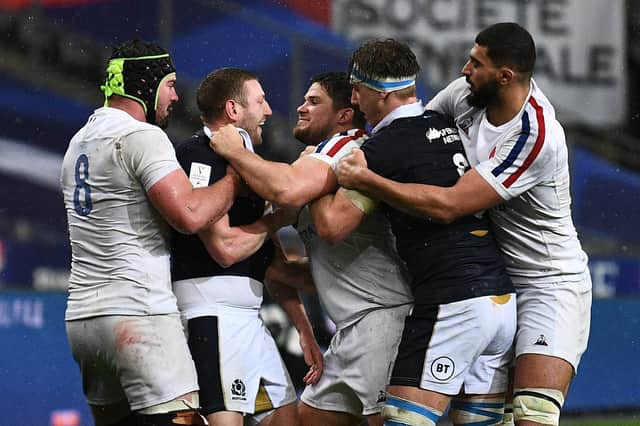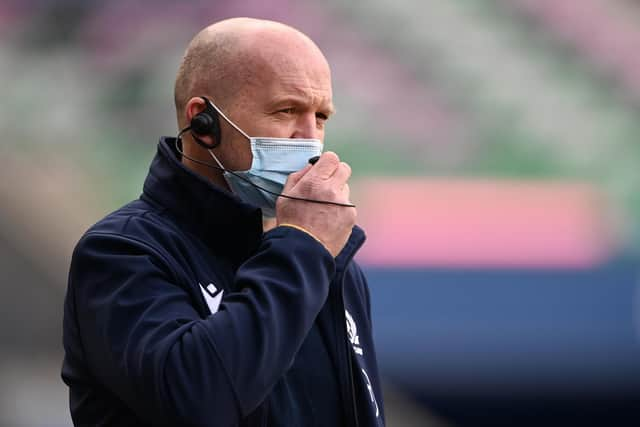Allan Massie: What was Finn Russell supposed to do? The collision came about because Brice Dulin was tackling high


Still, while we may think with regret of the wins that slipped away, which was certainly the case with the Welsh match, this was surely our best season since the Five Nations became Six. Gregor Townsend now has three wins in Paris to his credit, two – 1995 and 1999 – as a player, one as coach. No other Scot can match that.
Discount matches against Italy, and almost every game in the tournament was close. Only two matches were won by more than a single score. Welsh doggedness secured the title, deservedly one may think, but they might very easily have lost to Ireland and Scotland as well as France. The Duke of Wellington’s verdict on his victory at Waterloo – “a damned close-run thing” – might be applied to most of this season’s games.
Advertisement
Hide AdAdvertisement
Hide AdWe have greater strength in depth than for a long time. We entered the tournament without our two established hookers, Fraser Brown and Stuart McInally. George Turner and David Cherry stepped up and played very well. We went to Paris missing Jonny Gray, Scott Cummings and Matt Fagerson, all injured. Grant Gilchrist, San Skinner and Nick Haining came in and all had good games. Then young Cameron Redpath was out injured after an excellent debut at Twickenham. One looks forward to his return. It’s clear we now have competition for a place in almost every position.


The tournament saw a flurry of red cards. All were justifiable, given the very proper determination to clamp down on dangerous play, high tackles, charging into a ruck, contact made with neck, head and face. Yet only one – the dismissal notice given to Ireland’s Peter O’Mahony - seemed beyond argument.
Ohers invited questions, none more so than the red given to Finn Russell which has resulted in a three-match suspension which sees him miss Racing 92’s game against Edinburgh tomorrow. That Russell’s forearm made contact with Brice Dulin’s neck (or neck area, as referee Wayne Barnes first put it) is undeniable. But Dulin came in high, intending, one assumes, to stop Russell, prevent him from off-loading, and so win a scrum for France. Russell tried to fend him off, bending his elbow to do so. His forearm first took Dulin on the right shoulder, slipped up to the neck, then – all this happening at speed – finished beyond or over Dulin’s left shoulder. The collision and everything that followed came about because Dulin was tackling high. What was Russell supposed to do?
This sort of incident is common. It occurs because the law relating to what follows a tackle encourages players to go high, in order to hold up the ball-carrier and win the put-in at a subsequent scrum. Change this law and there will be fewer high tackles, fewer head-clashes, fewer attempts to fend off the tackler, fewer yellow or red cards.
Six of the Scotland heroes of the Auld Alliance Cup victory are back in Paris tomorrow for the Heineken match against Racing, only Rory Sutherland and Nick Haining absent injured. Edinburgh have pulled off the occasional surprise win in France; it’s fair to say that a victory in La Defense Arena would top the lot.
Richard Cockerill hasn’t had troubles to seek this season; this must be almost the first match in which he has been able to field an experienced XV with nobody who might be regarded as a colt or novice. The decision to start Blair Kinghorn at fly-half rather than Jaco van der Walt is interesting, so interesting indeed that I don’t know what to make of it. Grant Gilchrist was supreme in the lineout in the Stade de France, thanks partly to the accuracy of the throws from first George Turner and then Dave Cherry. Cherry will need to be as good again.
The one area where Edinburgh may be the stronger is the back-row, assuming Hamish Watson and Jamie Ritchie also reproduce their international form; they have Bill Mata to run powerfully off them. Likewise if Edinburgh can find the opportunity to move the ball wide, their wings, Darcy Graham and Duhan van der Merwe, have proved they can score tries against anyone. Odds favour Racing, obviously. But you never know.
A message from the Editor:
Thank you for reading this article. We're more reliant on your support than ever as the shift in consumer habits brought about by Coronavirus impacts our advertisers.
If you haven't already, please consider supporting our trusted, fact-checked journalism by taking out a digital subscription
Comments
Want to join the conversation? Please or to comment on this article.